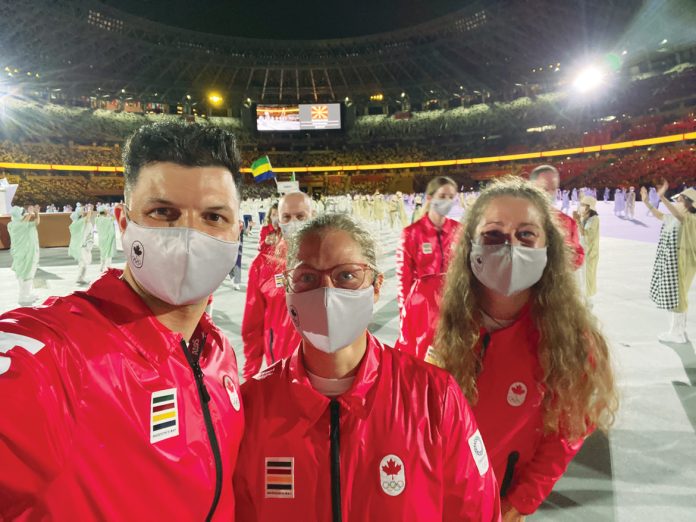By Charlie Senack
After the games were postponed in 2020, Kitchissippi resident Michael Tayler finally got the chance to compete in the Tokyo Olympic Games this summer.
Born and raised in Westboro, Tayler started kayaking at the age of eight. His parents enrolled him last-minute into summer camp, where he was trained by a national team member. His time in camp was the start of an athletic commitment that would span over two decades.
Within a year, Tayler made his way to a local competition and then climbed the ranks to nationals. His goal was just to make a junior team; the Olympics were a distant dream. But after a lot of training, the kayaker made his way to the senior level and that’s when everything changed.
This year’s games was the third Olympic run for the 29-year-old.
During his first run, Tayler secured Canada’s only canoe/kayak slalom spot at the 2012 London games, finishing 20th in the K-1 Men’s event. Then, he represented Canada once again at the 2016 Rio games, where he finished 16th in the K-1 Men’s event, missing the semifinals by just one spot.
Tayler says he admits his performance in Tokyo was not his strongest, coming in 24th place in the canoe/kayak slalom.
“Honestly, it was a difficult race for me,” Tayler told Kitchissippi Times soon after returning home to Canada. “Part of it was that, leading up to the Olympics, I had a few injuries. For me, actually, funny enough, it was an ear infection, and being in the water all the time, it was an unexpected thing to happen. I’ve dealt with shoulder, back, and elbow injuries — we get all of those as kayakers — but this was a new one for me and I struggled with it for over six months.”
Tayler said it was tough at times, and being unable to train was an added barrier. But he pushed forward and did the best he could.
“You always have a chance to compete and show what you can do, but I knew it was going to be difficult for me to get into the semifinal and I knew that things would have to go perfectly with a little bit of luck,” the local Olympian said. “Unfortunately, that didn’t happen.”
Olympians who competed in Tokyo also had to deal with record-breaking heat and humidity. Even on the water, temperatures soared past 40 C, feeling even hotter with the humidex. Ice vests were ready on hand at competitions along with umbrellas and lots of ice water. And Tayler said some athletes came down with heat-related illnesses.
But even so, the Tokyo Olympics were an experience to remember. With the pandemic, it looked very different from previous games. Athletes had to undergo daily COVID-19 testing, and they could not travel outside bubbles within the Olympic Village. There were many calls to cancel the games altogether due to an uptick in COVID-19 infections spreading across Japan, leading Tokyo to enter another lockdown during the games.
Tayler says even though spectators weren’t allowed in the stands and athletes’ family members couldn’t travel to cheer them on, the messages of support were overwhelming.
“There was a bit of a missing atmosphere in terms of no spectators, but at the same time, all of us as athletes know that everyone was watching from home. We have got messages of support, and friends and family that can’t be there were still watching from home and that felt really great,” he said.
“It was definitely a different game experience having been to other ones, but, at the end of the day, the race is the same and we are there to compete, so that was a really special moment.”
One of the highlights for Tayler was having the chance to walk in the opening ceremonies while representing Team Canada.
“Being a part of the Canadian team, walking in the opening ceremonies — it was a really small group of Canadians that were able to do it for a number of reasons,” he said. “It was a different experience because there were about only 30 of us that walked, and you spent time together from in the box to waiting in the wings of the arena, so it was cool that I got to know some of the other Canadians. It was a special experience to be in such a tight-knit group.”
The 2020 Olympic Games had to be postponed a year due to the pandemic, making the next summer games in Paris only three years away. But Tayler said he’s almost at retirement age for his sport and is ready to spend more time at home with friends and family.
“It was always my plan to retire from the sport after the Tokyo Olympics,” he said. “It is difficult for us. We have to spend a lot of time away from home and I’m ready to stay home. I still plan to keep training but I’m going to step back for the next year.”
When Tayler returned home from the games, it was his first time back on Canadian soil in over six months. Before the Olympics, he was busy training in Europe. He also works part-time at RBC and will now be seeking full-time employment. But even though Tayler might step back from competing in future, he wants to be available to inspire other young athletes.
“We have some young athletes in the group [who] are up and coming, so I want to be there for them to support them and keep the competition level high, because I can now give back being a little bit older and more experienced,” he said.
